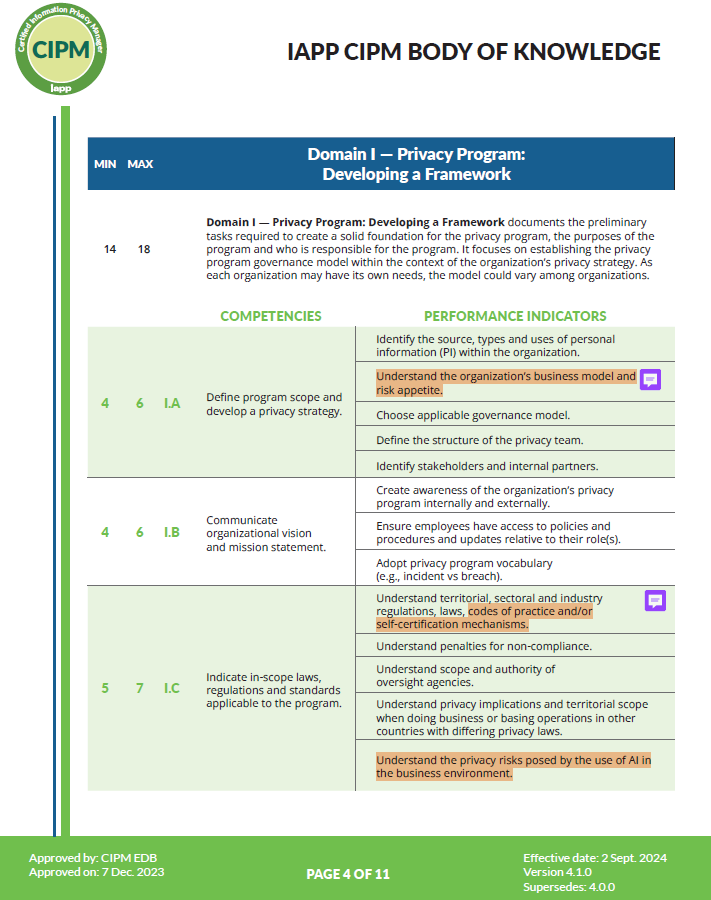2024 CIPM Exam: New Topics and Updates Explained
As of September 2, 2024, the Certified Information Privacy Manager (CIPM) exam has undergone some changes. While the core structure remains consistent, with no significant adjustments to the number of questions or the introduction of major new topics, there are some noteworthy updates in the Body of Knowledge and Exam Blueprint (version 4.1.0). These changes are largely textual, with only four minor topics being added.
The Four New Topics
Understanding the Organization’s Business Model and Risk Appetite
The exam will now place more emphasis on understanding an organization’s business model and risk appetite, under Domain I, which focuses on defining the scope and strategy of a privacy program. For privacy professionals, it is crucial to align privacy strategies with the organization’s unique business objectives and risk tolerance. The business model determines how a company creates, delivers, and sustains value, while the risk appetite reflects the level of risk the organization is willing to take to achieve its goals. Understanding these elements enables privacy professionals to develop privacy programs that not only meet legal requirements but also support the organization’s strategic objectives. This involves collaborating across departments to identify and manage privacy risks in a way that aligns with the overall business strategy.
Codes of Practice and/or Self-Certification Mechanisms
The exam has expanded its focus to include codes of practice and self-certification mechanisms in addition to territorial, sectoral, and industry regulations and laws. These voluntary initiatives allow organizations to demonstrate their commitment to privacy protection. Codes of practice and self-certification mechanisms provide guidelines and standards that exceed legal requirements, helping to build trust with customers and partners. Privacy professionals should understand and implement these tools as part of a broader privacy management program, streamlining compliance processes and reducing the risk of data breaches. Relevant examples include the EU-U.S. Data Privacy Framework, ISO/IEC 27701, and Binding Corporate Rules (BCRs), which assist organizations in complying with privacy laws and implementing effective data protection practices.
Creating Data Retention and Disposal Policies and Procedures
Establishing data retention and disposal policies is a fundamental aspect of data management. This topic focuses on developing strategies to ensure that data is retained only as long as necessary for legitimate business purposes and securely disposed of when no longer needed. Effective data retention and disposal practices help organizations ensure compliance with privacy laws and reduce the risk of data breaches. Privacy professionals must work closely with IT and legal teams to develop policies that meet legal requirements while supporting the organization’s operational needs. Implementing automated data deletion systems can also help minimize human error and improve the efficiency of the data management process.
Collaborating with Relevant Stakeholders to Identify and Evaluate Technical Controls
The updated exam emphasizes the importance of collaboration with stakeholders, particularly when evaluating technical controls. Collaborating with relevant stakeholders is essential for identifying and assessing technical controls that protect data privacy. This topic highlights the importance of interdisciplinary cooperation, where privacy professionals work with IT, security, legal, and other teams to develop effective technical solutions. Such collaboration aids in identifying potential privacy risks and implementing technical measures like encryption, access control, and monitoring to mitigate these risks. Privacy professionals must not only understand the technical aspects but also be able to communicate the business impact of technical controls to non-technical stakeholders. By adopting a collaborative approach, organizations can develop robust privacy protection strategies that comply with legal requirements and support operational efficiency.

What Does This Mean for Exam Candidates?
The changes to the CIPM exam are relatively minor and should not require significant adjustments to your study plan. Reviewing these updates should suffice to ensure you are well-prepared.
It is also important to get familiar with the Body of Knowledge and the Blueprint of the CIPM exam, you can find these documents here: https://iapp.org/certify/get-certified/cipm/
We would also recommend you to join our CIPM Course, read more about our course below.
Our CIPM Course
If you’re in search of a streamlined learning approach, aiming to tap into the expertise of seasoned professionals, access comprehensive course materials in one convenient location, and significantly boost your chances of success, look no further than our CIPM training course. This all-encompassing program has been skillfully crafted not only to save you time but also to provide valuable insights drawn from the experiences of others. Enrolling in this course will provide you with a deeper grasp of essential concepts. Come along on this journey to unlock your full potential in the realms of data protection and privacy.
Our course layout aligns seamlessly with the chapters of the knowledge book. Each chapter kicks off with an instructive video introduction (a sample is provided below). Following the video are concise narratives and quizzes. Specific elements of the curriculum are further explored within the online environment. We place significant emphasis on the chapters that carry the highest weight (score) within our comprehensive course.
This course offers a harmonious blend of videos, a summary of the official textbook, three full-length practice exams (each consisting of 90 questions), additional questions, invaluable insights, and helpful tips to bolster your preparation. To dive deeper into our course content, we invite you to register for our free demo and also explore our practice questions. Rest assured that our course materials amply equip you to tackle the CIPM exam in a single attempt. Alongside this, you’ll receive the study outline in PDF format to steer your learning journey. As an extra resource, we’ve appended 30 sample questions to this guide; they can be found in the attachments.
Check out the full CIPM Study Guide here: https://cipptraining.com/cipm-study-guide-2024-obtaining-your-cipm-certification/
Link to the CIPM Exam updates of 2023: https://cipptraining.com/upcoming-changes-to-the-cipm-exam-in-2023-a-comprehensive-overview/



